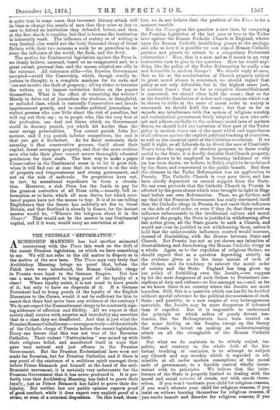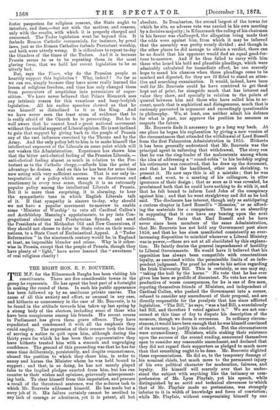THE PRUSSIAN "REFORMATION."
ARCHBISHOP MANNING has had another animated controversy with the Times this week on the drift of the recent Prussian legislation, on which we have something to say. We will not refer to the old matter in dispute as to the motive of the new laws. The Times says very truly that Archbishop Manning brings no proof that, before the Falck laws were introduced, the Roman Catholic. clergy in Prussia were loyal to the German Empire. But how can a man be expected to bring proof of the loyalty of a
class ? Where loyalty exists, it is-not usual to have proofs of it, but only to have no disproof's of it. If a German Protestant had to bring proofs of the loyalty of the English Dissenters to the Crown, would it not be sufficient for him to assert that there had never been any evidence of the contrary ? We do not expect the Nonconformist clergy to be constantly sign- ing addresses of affection and fidelity. All we expect is that society shall receive with surprise and incredulity any assertion that as a class they are disaffected. And that is just what the Prussian Roman Catholics say—we suppose truly—of the attitude of the Catholic clergy of Prussia before the recent legislation. Every one knows that this was not true of the Bavarian Catholics. Their violent "Particularism" was mixed up with their religious belief, and manifested itself in ways that gave very natural and just offence to the Prussian Government. But the Prussian Ecclesiastical laws were not made for Bavarian, but for Prussian Catholics, and if there is any proof of the existence of a seditious spirit amongst them before Prince Bismarck put himself at the head of the anti- Romanist movement, it is oertainly very unfortunate for the Prussian Government that it has never produeed it. It is per- fectly true that Archbishop Manning has failed to prove their loyalt; just as Prince Bismarck has failed to prove their dis- loyalty. But neither law nor public opinion expects proof of good conduct, while it does expect very explicit proof of a crime, or even of a criminal disposition. On this head, there- fore, we do not believe that the position of the Times is for a moment tenable.
But the Times gives the question a new turn, by comparing the Prussian legislation of the last year or two to the Tudor laws against the Roman Catholic Church in England, where. upon the Roman Catholic Archbishop grasps at the analogy, and asks us how it is possible we can expect Roman Catholic prelates and priests to submit to a compulsory Protestant reformation ? Now, that is a new, and as it seems to us, very instructive turn to give to the question. How far would any- thing like the policy of the Tudor Reformation be really wise and defensible in modern Europe ? We should reply at once, that so far as the secularisation of Church property subject to great moral abuses is concerned, we should regard that policy as not only defensible, but in the highest sense just, in modern times ; that so far as complete disestablishment is concerned, we should often hold the same ; that so far as the forcible dissolution of orders and corporations which can be shown to strike at the roots of moral order in society is concerned, we should hold the same ; but that so far as regards any interference with the system of religious worship and ecclesiastical government freely adopted by men who sub- mit and adhere cordially to the ordinary moral laws of modern States, we should hold any imitation of that part of the Tudor policy in modern times one of the most wilful and superfluous of all offences against the explicit political teaching of centuries, as well as the essential spirit of the Christian revelation. If we hold it right, as all Liberals do, to divert the uses of Charitable Trusts from the support of obsolete purposes to those really useful to the State, it is hardly deniable that Church property, if once shown to be employed in fostering indolence or vice (as has been shown, we believe, in Italy), ought to be reclaimed by the State, and consecrated to the public benefit. But then this element in the Tudor Reformation has no application to Prussia. The Catholic Church is very poor there, and has been chiefly dependent on annual support from the State. No one even pretends that the Catholic Church in Prussia is affected by the gross abuses which were brought to light in Eng- land before our own Reformation. Then, we go further, and say that if the Prussian Government has really convinced itself that the Catholic clergy in Prussia do not exert their influence on the side of civil order, or even if they do, that they exert an influence unfavourable to the intellectual culture and moral vigourof the people, the State is justified in withdrawing, after fair notice given, all the State grants to such a Church, and would not even be justified in not withdrawing them, unless it held that the unfavourable influences exerted would increase, instead of diminishing, with the divorce between State and Church. But Prussia has not as yet shown any intention of disestablishing and disendowing the Roman Catholic clergy as a whole. Again, as to the expulsion of religious Orders, we. should regard that as a question depending strictly on the evidence given as to the inner morale of each of the Orders, and its tendency to subvert the moral order of society and the State. England has long given up her policy of forbidding even the Jesuits,—we suppose by far the most dangerous of such Orders to Protestant con- ceptions of duty and culture—to live amongst us,—and, as far as we know, there is no country where the Jesuits are more harmless. Still, this is a question which can hardly be decided without special reference to the political circumstances of each State ; and possibly, in a new empire of very heterogeneous materials, the Jesuits may be more dangerous if tolerated than if expelled. But it is impossible to understand the principle on which orders of purely devout ten- dencies, like the Redemptorists, have been treated on the same footing as the Jesuits, except on the theory that Prussia is intent on making an undiscriminating attack on all the strongholds of the Roman Catholic faith.
But what we do maintain to be utterly unjust, im- politic, and contrary to the whole drift of the his- torical teaching of centuries, is to attempt to subject any Church and any worship which is regarded as ad- missible at all under modern conceptions of the moral' ends of government, to a forcible control wholly incon- sistent with its principles. We believe that the inter- ference of the State is properly limited to dealing with the moral and social outcome of creeds, not with creeds them- selves. If you won't vaccinate your child for religious reasons, if you won't educate your child for religious reasons, if you insist on widows burning themselves for religious reasons, if 'you excite tumult and disorder for religious reasons, if you foster pauperism for religious reasons, the State ought to interfere, and does,—but not with the motives, and reasons, only with the results, with which it is properly charged and concerned. The Tudor legislation went far beyond this. It forbade Roman Catholic ceremonials, for instance, by penal laws, just as the Roman Catholics forbade Protestant worship, and both were utterly wrong. It is ridiculous to repeat to-day the blunders of the times of the Tudors. And it is because Prussia seems to us to be repeating them in the most glaring form, that we hold her recent legislation to be so utterly bad.
But, says the Times, why do the Prussian people so heartily support this legislation ? Why, indeed ? So far as we can see, simply because they have never really learned the lesson of religious freedom, and time has only changed them from persecutors of scepticism into persecutors of super- stition. We have never believed that Prince Bismarck sees any intrinsic reason for this vexatious and busy-bodyish legislation. All his earlier speeches showed us that he was himself as disinclined to it as the King. And we have never seen the least atom of evidence that he is really afraid of the Church he is persecuting. But he is well aware that he cannot head a great national movement without the cordial support of Liberal opinion. He is not inclined to gain that support by giving back to the people of Prussia any of the vast influence exercised by the Throne and by the Army. And the only policy left to him is to make himself the intellectual exponent of the Liberals on some point which will not weaken the Administration. Experience has shown him that the bitter anti-clerical feeling of the Prussian Liberals,—. anti-clerical feeling almost as much in relation to the Pro- testant as to the Catholic clergy,—affords him the point of advantage he desires. And on this he has been for some time now acting with very sufficient success. That is our only in- terpretation of a policy which seems to us disastrous and reactionary in every true sense, though it is an extremely popular policy among the intellectual Liberals of Prussia. But it is more than surprising, it is alarming, to hear the sympathetic tone in which English Liberals talk of it. If that sympathy is sincere to-day, why should we not have a popular movement to-morrow to enable some 'Minister of Worship' to veto all Cardinal Cullen's and Archbishop Manning's appointments, to pry into Con-
gregational elections and Presbyterian Synods, and send the Presidents of the Methodist Old and New Connexions, if they should not choose to defer to State vetos on their nomi- nations, to a State Court of Ecclesiastical Appeal. A "Tudor Reformation" in the nineteenth century would be, in England at least, an impossible blunder and crime. Why is it other- wise in Prussia, except that the people of Prussia, though they have plenty of "light," have never learned the " sweetness " • of real religious charity ?











































 Previous page
Previous page